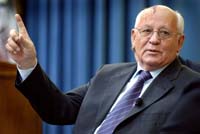Gorbachev says Russia won't accept foreign meddling
Mikhail Gorbachev, the last leader of the Soviet Union, on Tuesday added his voice to Russia's resentment of alleged U.S. meddling in the country's politics, but also expressed concern about media freedom in the country, news reports said.

The Foreign Ministry and Russian legislators this month have issued an array of complaints about a U.S. State Department report that criticized Russia's human rights record and pointedly avoided characterizing the country as a democracy. The report also described the expenditure of tens of millions of dollars on projects to strengthen democracy in Russia, including nearly US$4 million (EUR3 million) to support democratic political parties.
Russian officials say such support is illegitimate meddling in the country's internal affairs and they contend the United States wants to foment mass demonstrations like those that helped propel pro-Western leaders into office in ex-Soviet Georgia and Ukraine in recent years.
Gorbachev echoed those positions at a conference in Moscow.
"A sovereign state cannot live using patterns imposed on it. We must adopt a clear-cut position: we won't accept any guidelines," the Interfax news agency quoted Gorbachev as saying. "Democratic processes must grow on national soil. Only in this way will they be effective and influence the situation in the country."
The comments by Gorbachev, whose policies broke the grip of monolithic Communism, came just days after police in St. Petersburg and Moscow harshly cracked down on demonstrations called by opposition groups to protest what they call the strangulation of democracy under President Vladimir Putin.
The crackdown included police beating some demonstrators and detaining hundreds. The events were extensively covered by foreign news media, but were reported only comparatively briefly on Russia's main television channels, which are either state-controlled or under apparent strong state influence.
Interfax quoted Gorbachev as saying the current media situation "looks like nationalization" and "we cannot get exhaustive information that would keep citizens informed and allow them to judge what's going on."
Russia holds parliamentary elections in December and in March is to have elections to choose the successor to Putin, who is constitutionally barred from seeking a third term.
Opposition groups say authorities are severely stifling their activities in order to ensure election of a parliament consisting mostly of Putin supporters and of whomever Putin favors to succeed him.
Putin has not yet expressed support of any politician to follow him, but the growing prominence of deputy prime ministers Dmitry Medvedev and Sergei Ivanov - both of whom appear almost daily on TV news shows - has led to wide speculation that one of them will get the nod from the highly popular Putin.
Subscribe to Pravda.Ru Telegram channel, Facebook, RSS!


